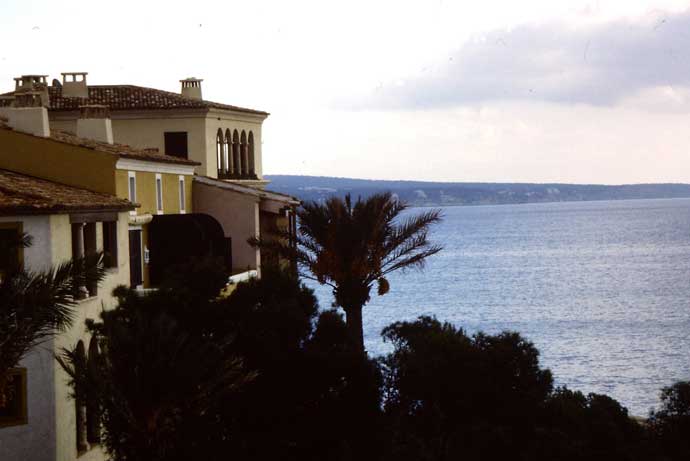Strikes me now that Gaia might be pleased to see us gone. We've trashed our room, we think "the world" revolves around us, and we're certainly not listening any more to what the thunder says. There's a weekly Q&A interview in a(n inter)national newspaper in which the regular question used to be asked: "Do you think about your carbon footprint?" The question seems to have gone now (although the Q&A survives), perhaps because the answer was too often a yes qualified by the admission that the interviewee really had to fly around the world burning up fossil fuels in pursuit of some career objective. Think about my carbon footprint all the time, me. Any chance of an upgrade to first? I have the air-miles.
Seems to me that globalisation doesn't work (discuss), but that's a subject for another day. Global warming may or may not be the cause of the tragedy now happening in the Caribbean, and it may or may not explain why Florida residents are being warned to look out for displaced alligators as they move back into their properties, but what troubles me is that if Gaia really has turned against us, it won't be "the world" that ends. And it won't matter then whether we've finally agreed that global warming is or isn't real. Water is now being offloaded from aircraft in the Caribbean, and there are even British troops on the scene - pursued, as is traditional, by British journalists complaining that they're not moving fast enough.
But in the background, there's an official response going on that feels, to me at least, much more familiar. News reports suggest that OECD rules prevent British aid being given to British overseas territories (Anguilla, Turks & Caicos Islands, British Virgin Islands) because (only on paper now, but that's what counts) their GDP is too high. Overseas development secretary Priti Patel tells us that she's "written to" the OECD's "development assistance committee" asking them to change the rules. Boris Johnson has toured the islands (remember him in Liverpool?) and is reportedly about to chair a meeting of the COBRA emergency committee. That's two committees in one paragraph. Now I understand why all the governments, etc., of my early childhood so regularly called in International Rescue.
At least Cabinet Office Briefing Room A looks like every White House Situation Room known to fiction, which is reassuring, and we can assume that Hurricane Irma hasn't disrupted the postal service between the OECD and Ms Patel's office. Talk about grown up. It's just that ... I remember the contrast between the official response and the community response after the Grenfell Tower fire. If "the world" does end, will we be stuck with the official response? Will the final broadcast show Boris Johnson touring the battlefield at Armaggedon, or should we maybe think a bit harder about the simple truth that "the world" doesn't need us. For all we know, Gaia might look quite kindly on - what? Termites? Water Bears? Our successors, anyway.
Appropriately, in the sense that if you're a romantic novelist, don't tweet about your love for slasher movies. If you're a Michelin-starred chef at a health-food restaurant, don't tweet about your new-found passion for junk food. If you're the president of a global superpower, don't get into a tweeting contest with - sorry.
Anyway, in the video I watched, Mr Hyatt was discussing ""The Five Elements of A Personal Brand"; you can find it here. I won't spoil it, except (very slightly, sorry) to say that at one point Mr Hyatt suggested that, in building your powerful personal brand: "You need a gerund."
Eh? I may write this stuff, but that doesn't mean I know the technical terms. So I looked up "gerund". And dear old Wikipedia gave me this: "Gerund is a term for a verb form that functions as a noun. Although similar in usage to verbal noun, the two terms are not synonymous as gerund retains properties of a verb while verbal noun does not; in English this is most evident in the fact that a gerund can be modified by an adverb and can take a direct object. The term "-ing form" is often used in English to refer to gerund specifically. Traditional grammar made a distinction within -ing forms between present participles and gerunds, a distinction that is not observed in..."
...I can feel it slipping away. But I get Mr Hyatt's point: to have a gerund is to have a short, succinct phrase that sums up what you do. "Solving the world's problems." "Teaching your children to pass crucial exams." "Setting off fireworks safely." "Driving this bus." Please stop me, I could go on all afternoon.
Gerunds are wonderful, but like everything else, they can be over-used. After a while, also, they get static. If the gerund of the van says, "Keeping the traffic moving," but the miles of traffic cones say exactly the opposite, what's the use of the gerund? In that example, either it requires constant activity - a team of (wo)men constantly waving their arms and urging the traffic on - or it becomes almost a cross section of an activity - a steady-state, aspirational statement of being rather than doing.
It's a scale thing. Either the individual and his gerund work together - or the gerund disconnects and floats away into meaninglessness. Take responsibility for your gerund. Look after it. Act it out every day.
Gerund. Functions as a noun, right? In big companies, a verb that's turned to stone.

